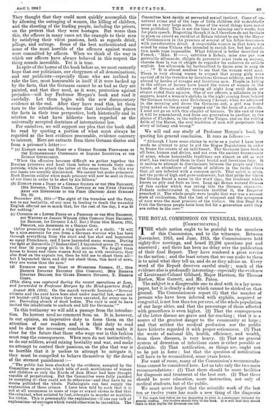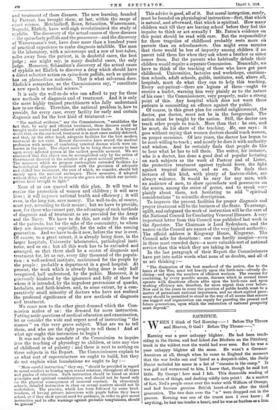THE ROYAL COMMISSION ON VENEREAL DISEASES. [COMMUNICATED.] T HE whole nation
ought to be grateful to the members of this Commission, and to the witnesses. Between November, 1913, and June, 1915, the Commissioners held eighty-five meetings, and heard 22,296 questions put and answered • and there has been no delay over the publication of their final Report. They have rendered a great service to the nation ; and the least return that we can make to them is to mind what they tell us, and do as they advise us. Every word of the Report deserves careful study ; much of the evidence also is profoundly interesting—especially the evidence of Lieutenant-Colonel Gibbard, Major Harrison, Sir Thomas Barlow, Miss Garrett, and Mr. Paton.
The subject is a disagreeable one to deal with in a lay news- paper, but it is clearly a duty which cannot be shirked on that ground. The Commissioners report (1) that the number of persons who have been infected with syphilis, acquired or congenital, is not less than ten per cent. of the whole population of our large cities, and that the percentage of those affected with gonorrhoea is even higher. (2) That the consequences of the latter disease are grave and far-reaching ; that it is a source of the greatest danger to the community at large ; and that neither the medical profession nor the public have hitherto regarded it with proper seriousness. (3) That the waste of national life, health, efficiency, and wealth, from these diseases, is very heavy. (4) That no general system of detention of infectious cases is either possible or desirable. (5) That notification, as things are, ought not to be put in force ; but that the question of notification will have to be reconsidered, some years hence.
For want of room many of the Commission's recommenda- tions cannot be considered here. Let us take only the two main recommendations : (1) That there should be more facilities for diagnosis and treatment of the best sort. (2) That there should be more education, more instruction, not only of medical students, but of the public. We must never forget that the scientific work of the last ten or twelve years has made a new thing of the diagnosis
• The words that follow are too disgusting to print In a newspaper Intended for
P:Ireading. Our readers should refer to the book. It is well that they should leratio what depths the Germans Can fall. and treatment of these diseases. The new learning, founded by Pasteur, has brought them at last, within the range of exact science. Metchnikoff, Roux, Schaudinn, Wassermann, Nocruchi, Ehrlich, have well-nigh revolutionized the study of syphilis. The discovery of the actual causes of these diseases —the spirochoeta pallida and the gonococcus—and the discovery of Wassermann's test, have done more than a hundred years of practical experience to make diagnosis infallible. The man in the laboratory, with a microscope and a row of test-tubes, miles away from the patient, is, in doubtful cases, the best )udge ; one might say, in many doubtful cases, the only judge. Moreover, Schaudinn's discovery of the actual cause of syphilis set Ehrlich to discover a drug which should have a direct selective action on spirochoeta pallida, such as quinine has on plasmodium malariae. That is what salvarsan does. Ehrlich's researches, as the Commissioners say, "constitute a new epoch in medical science."
It is only the well-to-do who can afford to pay for these new methods of diagnosis and of treatment. And it is only the more highly trained practitioners who fully understand how to use them. Therefore, the national problem is, how to provide, for every case, every facility for early and certain diagnosis and for the best kind of treatment :— " The medical evidence," say the Commissioners, "establishes the fact that, by early and efficient treatment, these diseases could be brought under control and reduced within narrow limits. It is beyond doubt that, on the one hand, treatment is in most eases unduly deferred, and that, on the other hand, adequate facilities for the best modern treatment do not exist. Recent discoveries have armed the medical profession with means of combating venereal disease which were un- known in the past. The object must be to bring these means to bear upon every infected person at the earliest possible moment. We are convinced that this object can be accomplished only by the action of Government directed to the solution of a great national problem. . . . The measures which we propose contemplate extended facilities for bacteriological diagnosis combined with the provision of adequate and skilled free treatment, the cost of which, we consider, should fall mainly upon the national exchequer. These measures, if adopted without delay, will go far to remove the grave evils which our investi- gations have brought to light."
None of us can quarrel with this plan. It will tend to ensure the protection of women and children ; it will save lives ; it will improve national health and efficiency ; it will even, in the long run, save money. The well-to-do, of course, must pay, according to their means; • but we have to provide, now, for those who cannot pay, the advantage of such methods of diagnosis and of treatment as are provided for the Army and the Navy. We have to do this, not only for the sake of the patients, but for the sake of the community, to whom they are dangerous ; especially, for the sake of the coming generation. And we have to do it now, before the war is over. Of course, to a great extent, it is already being done, in the larger hospitals, University laboratories, pathological insti- tutes, and so on ; but all this work has to be extended and arranged, so that there shall be a centre of diagnosis and treatment for, let us say, every fifty thousand of the popula- tion: a well-ordered institute, maintained for the people by the people : probably a department in a good hospital. At present, the work which is already being done is only half recognized, half understood, by the public. Moreover, it is grievously hindered by the ignorance and folly of those for whom it is intended, by the impudent pretensions of quacks, herbalists, and faith-healers, and, to some extent, by a com- paratively small minority of doctors who have not realized the profound significance of the new methods of diagnosis and treatment.
We come now to the other great demand which the Com- mission makes of us : the demand for more instruction. Putting aside questions of medical education and examination, let us consider the wide and urgent need of instructing "the masses" on this very grave subject. What are we to tell them, and who are the right people to tell them And at what age ought this instruction to begin It was not in the mandate of the Commission to inquire into the teaching of physiology to children, or into any vice of childhood or of puberty : and there is next to nothing on these subjects in the Report. The Commissioners explain to us what sort of superstructure we ought to build, but they do not explain what foundations we ought to lay :— " More careful instruction," they say, "should be provided in regard to moral conduct as bearing upon sexual relations, throughout all types and grades of education. Such instruction should be based on moral principles and spiritual considerations, and should not be based only en the physical consequences of immoral conduct. In elementary schools detailed instruction in class on sexual matters should not be undertaken. The practice, which has been followed by some head. teachers, of having private interviews with pupils before they leave school, or if they show special need for guidance, in order to give moral instruction and to offer warnings against probable temptations, should be general" This advice is good, all of it. But moral instillation, surely, must be founded on physiological instruction—fitst, that which is natural, and afterward, that which is spiritual. How many children wait till they are leaving school before they feel the impulse to think or act sexually ? Mr. Paton's evidence on this point should be read with care. But the responsibility for these tragedies of childhood probably rests more on parents than on schoolmasters. One might even surmise that there would be less of impurity among children if no parent told them lies when they ask where a brother or sister comes from. But the parents who habitually delude their children would require a separate Commission. Meanwhile, we have to think of the teaching of those who have got past childhood. Universities, factories and workshops, continua- tion schools, adult schools, guilds, institutes, and, above all, hospitals, must do what they can to help this teaching. Every out-patient—there are legions of them—ought to receive a leaflet, warning him very plainly as to the nature of his case : the Commissioners, very properly, make a strong point of this. Any hospital which does not warn these patients is committing an offence against the public. Of course, in this great plan for careful enlightenment, the doctor, qua doctor, must not be in the foreground. The nation must be taught by the nation. Still, the doctor can teach other people to teach. More than that : he can, and he must, do his share of the teaching. He, one says : it goes without saying that women doctors should teach women, on proper occasions. Of late years, the doctor has begun to be more willing to teach ; and mostly he does it with authority and wisdom. And he certainly finds that people do like to hear what he has to tell them. The writer, for instance, who is a doctor, has done a good deal of popular lecturing on such subjects as the work of Pasteur and of Lister, the protective treatment against typhoid fever, the fight against tropical diseases, and so on. He finds that lectures of this kind, with plenty of lantern-slides, are always welcome. It would be easy for any man, with an audience of men, to show spirochoeta and gonococcus on the screen, among the series of germs, and to speak very plainly about them, not hesitating to add spiritual considerations" to scientific descriptions.
To improve the present facilities for proper diagnosis and proper treatment will be the business of the State. To arrange, uplift, and safeguard the work of instruction will be the care of the National Council for Combating Venereal Diseases. A very important letter from this Council was published last week in the Spectator. The Chairman is Lord Sydenham, and the names on the Council are names of the very highest authority. The official address is Kingsway House, King-sway. The Council asks for donations : one can hardly imagine—even in these most crowded days—a more valuable sort of national service than this which they are taking in hand. In the last paragraph of their Report the Commissioners have put into noble words what none of us doubts, and all of us are thinking
" The diminution of the best manhood of the nation, due to the losses of the War, must tell heavily upon the birth-rate—already de- clining—and upon the numbers of efficient workers. The reasons for combating, by every possible means, diseases which in normal times operate with disastrous effects alike upon the birth-rate and upon working efficiency are, therefore, far more urgent than ever before. Now and in the years to come the question of public health must be a matter of paramount national importance, and no short-sighted parsi- mony should be permitted to stand in the way of all means that science can suggest and organization can supply for guarding the present and future generations, upon which the restoration of national prosperity must depend."































 Previous page
Previous page